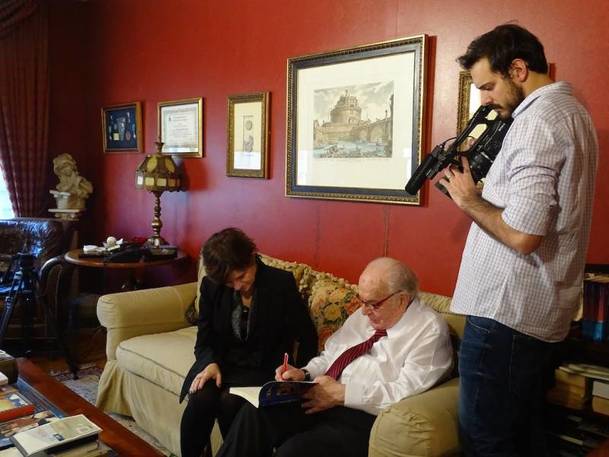Tanto gentile e tanto onesta pare
la donna mia, quand’ella altrui saluta,
ch’ogne lingua devèn, tremando, muta,
e li occhi no l’ardiscon di guardare
We’ll entrust Joseph Tusiani to translate these lines from Dante Alighieri’s La Vita Nuova, for generations ingrained in the memory of all Italian students:
So winsome and so worthy seems to me
my lady, when she greets a passer-by
that every tongue con only babble shy
and eager glances lose temerity.
Women, the past, and the importance of translation
Why begin with a translation of a medieval poet talking about women and love? Women and love because these are ripe topics for an issue covering February, considered the month of love (Valentine’s Day), and March, which is Women’s History Month. In Europe they celebrate International Women’s Day on March 8 and in New York they commemorate the tragic Triangle Fire of 1911, in which dozens of immigrants, mostly Italian and Jewish women, died in a fire at their workplace. A poet of the past because now more than ever we believe that looking back is the best way to interpret our present. As Anthony Tamburri lovingly recalls Felix Stefanile’s motto, “There is no ontology without archeology!”
A translation because the world of a translator symbolizes the challenge we all face in bridging different worlds. And it’s not for nothing that the translator we chose, Joseph Tusiani, is known as “The Poet of Two Lands”
Different Italies in search of a common language
Tusiani is always bound for elsewhere, not only physically but intellectually. His poems and many translations—from and into Latin, English, Italian, and Apulian dialect—capture the mystery of traveling from one world to another, the deprivations and rewards of a diaspora felt from within. This past January Tusiani was named Poet Laureate Emeritus of the State of New York by Governor Andrew Cuomo.
The son of a Pugliese carpenter who emigrated to the United States of America a few months prior to his birth, Tusiani didn’t meet his father until after he had graduated from college and came to New York with his mother. His story seems to belong to “another world,” a world in which distances had yet to be erased by the Internet. But Tusiani’s dedication to his craft—translation in particular—is a more powerful tool for breaking down distances as well as those socio-cultural barriers that cut people off.
In our small way, we at i-Italy are working toward a similar end. It’s true we talk about Italy—the Italy of New York—but you’ll also have noticed within that story there exist different worlds, universes seemingly apart, distant ways of seeing. There are many Italies—in the motherland and abroad—and in our opinion that diversity is the country’s real promise as long as it can be translated into a common language that retains complexities and surmounts stereotypes.
Encouraged by many and frustrated by a few, we will forge ahead with our mission of cultural translation and mutual understanding through our integrated web/print/TV platform that is still the only one of its kind in the Italian diaspora.
An (almost) all-fem issue
But getting back to the subject of women: As you’ll notice, this is an all-fem issue. Maria Teresa Cometto authors a profile of Natalia Quintavalle (our outgoing Consul General who brought a woman’s touch to her office and to whom we bid a fond farewell!); Francine Segan writes on Lidia Bastianich; Lucia Pasqualini on Elisabetta ‘Lisa’ Calello; and myself on Linda Carlozzi.
Furthermore, the illustration on the left-hand side of our cover was designed by Olimpia Zagnoli, featured in our cover story along with her colleague Emiliano Ponzi, who designed the other side of the illustration—who was it that said “women hold up half the sky”? Our Style section features a story on hairstylist Maria Teresa Sansalone, and on our Bookshelf sits Judith Harris’ review of “literary sensation” Elena Ferrante. The Tourism section dedicated to Venice has a woman’s touch too: Dominique Fernandez’s defines the city as “feminine” and we chat with Enrica Rocca, the “Contessa of Venetian Cuisine.”
That isn’t to say that there are no men; they’re just in the minority. We talk with the highly original artist Marco Gallotta and highlight our good friend Fred Plotkin, recently honored with the Cavaliere della Repubblica Italiana, as he prepares for his new installment of Adventures in Italian Opera. Plus our special feature on wine is exclusively male, with Eric Asimov, Luciano Pignataro, Dan Amatuzzi and Charles Scicolone.
Last but not least, the most famous Italian venture capitalist in New York, Alessandro Piol, reminds us in his feature interview that Italian excellence is not limited to bel canto and la moda…It also applies to technology, particularly to that innovative approach that weds technology, design and even art. Do we dare call it technology with a woman’s touch?
([email protected])


